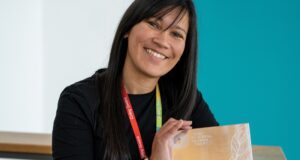A project studying whether plants can survive on the lunar surface has booked a ride on Intuitive Machines’ third mission, scheduled for take-off next year.
In July 2023, the Australian Lunar Experiment Promoting Horticulture (ALEPH) project received $3.6m as part of the Australian Space Agency’s Moon to Mars Initiative.
The project is led by Australian start-up Lunaria One working in collaboration with a number of universities, non-profits and industry partners.
The aim is to take a payload into space that contains seeds and plants, and eventually grow plants that astronauts can eat when on the Moon and Mars.
This is more challenging than it sounds as the plants and seeds have a lot to endure before they even get to the lunar surface, including lengthy storage at the launch pad, intense vibrations during lift-off and extreme temperature variations from 120-130°C below zero.
According to Lunaria One, investigating whether seedlings can grow on the lunar surface is of fundamental biological interest and important to know for possible future space exploration. It could also teach us more about growing plants in a changing climate here on Earth.
Lauren Fell, director of Lunaria One, told The Guardian: “As we look towards having a more sustainable human presence on the moon, and then Mars, we need to develop ways of sending things up there that can grow.”
It has now been confirmed that the seeds and plants of the ALEPH mission will be transported in a specially designed and hermetically sealed chamber aboard Intuitive Machines’ third mission IM-3, scheduled for take-off in 2025. The hope is that by 2026 the seedlings will be growing on the lunar surface.
In 2024, Intuitive Machines became the first private company to successfully land a spacecraft on the surface of the moon.
After landing on the lunar surface, the plants’ growth and general health will be monitored and data and images will be beamed back to Earth for schoolchildren and interested citizens around the world to view and engage with.
Fell said that the central value guiding the ALEPH project was that space exploration is for everyone. The aim is to “open up the science and engineering behind growing life on the Moon so that anyone can be involved”.
In other recent space news, Space Solar, a UK-based company developing space-based solar power, has announced an agreement to provide Reykjavik Energy with electricity from the first-ever space-based solar power plant.
Space Solar’s first plant is set to be operational by 2030 with an initial capacity of 30MW, with plans to scale up to a large-scale system by 2036.
This solar power system will orbit Earth, harnessing solar energy and transmitting it wirelessly via safe high frequency radio waves to ground-based stations.
These stations will convert the energy into electricity and feed it directly into the power grid, providing clean, renewable energy 24/7, regardless of weather or cloud cover and with electricity costs similar to intermittent renewables.
Martin Soltau, co-CEO of Space Solar, said: “Space-based solar power offers unparalleled benefits with competitive energy costs and 24/7 availability. Reykjavik Energy’s recognition of the potential for space-based solar to drive the energy transition is exciting, and we’re thrilled to be working together in partnership towards a sustainable future.”




